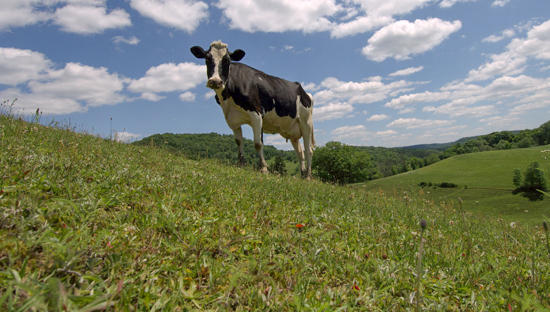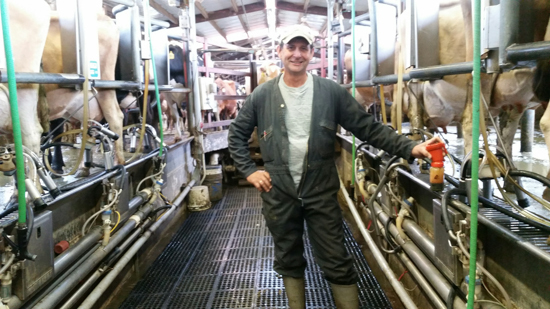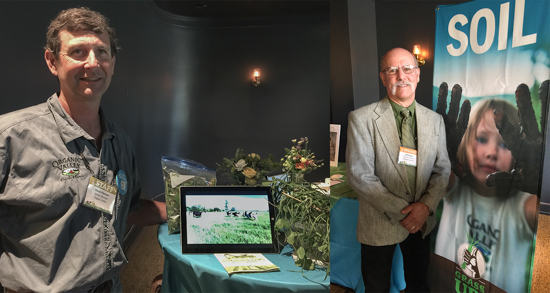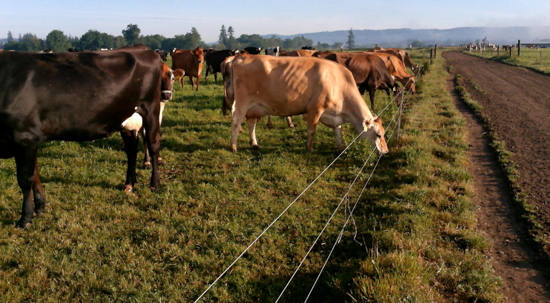As any nursing mother can tell you, a mother who eats pepperoni pizza produces milk which will taste significantly different to her child. Additionally, her milk will also sustain her child with different vitamins, minerals and proteins due to her diet. This idea doesn't just apply to humans: the cow milk you drink is fundamentally impacted by the feed the cow consumes. This line of thinking extends to the key source of all nutrients found in our food...the soil. Healthier soil feeds healthier plants, which feed healthier cows, which produce healthier milk, which makes healthier people.
This week I was invited to learn about the agricultural work being done for our future at Grass Up!, one of many national think tank pop-ups lead by Organic Valley's educational campaign to promote a more sustainable food future. Theresa Marquez, Organic Valley's Mission Executive, invited an influential group of farmers, scientists, educators, and activists who are leading dynamic conversations about the benefits of sustainable farming for soil, pastures, produce, animals, people, and our planet.
At Grass Up!, I met Steve Pierson, an organic diary farmer who used to farm using conventional methods. With tufts of dark green grass and clover in his hands, he proudly spoke of the quality of his pasture and his herd of free-range grazing cows. Steve explained to me how his farm's organic transition took years and the burden it placed on his business and his family. He was unequivocal that without the help of Organic Valley, a farmer-owned co-op, he would've lost his farm. He told me that there was a "high likelihood of the farm not being financially sustainable in a unstable conventional dairy market [...] This would most certainly not have allowed the next [5th] generation to continue farming and thus the death of yet another small family farm. This may not sound like a big deal in the grand scheme of things, but small farms are the lifeblood of rural communities. As small farms disappear, well, you can connect the dots..."
Six "learning center" tables offered a feast of delicacies for the 100+ participants, creating a happy grazing haven. The "Pastures" table offered Tunisian beef brik with potato, parsley & egg and whipped boueu & beef skewers. Here we learned that organic soils, especially organic pastures, improve the ability of the land to "sequester" or store carbon, which helps reduce global climate change. The "Soil" table presented roasted beet with preserved lemon, whipped feta, and pistachio, as well as conversation lead by Pesticide Action Network Senior Scientist Dr. Margaret Reeve, who taught about the similarity of our digestive tract to the biology of soil. At the "Nutrition" table, we devoured grilled peach with crème fraiche and mint caprese while learning from Melinda Hemmelgarn and Dr. Silvia Abel-Caines, about the differences in cattle health between confined animal feeding operations (CAFO) serving up GMO corn and soy and a free range pasture fed diet.
The keynote speaker of the event was Jeff Moyer, the Executive Director of the Rodale Institute, a non-profit research farm in Kutztown, PA. I had visited four years ago to write a story on The Rodale Institute and I was looking forward to getting an update. The Rodale Institute embraces the maxim of its founder, J.I Rodale: "healthy soil equals healthy food, which equals healthy people." What the Rodale Institute has found in over 35 years of research is: how we treat our soil has a direct effect on the food it produces. In one of their many experiments, the Rodale Institute discovered that oats grown in organic systems have significantly higher mineral content than oats grown in conventional systems. That experiment is now being repeated to examine the difference between them in vitamins and protein analysis as well. Preliminary results have shown that with more grass and cover crops (such as rye and vetch) in the farming system, and less tillage of the system, there's an increase of protein in that crop. An additional trial on soil health's effect using corn and soybeans has shown that in organic no-till systems, where tillage is reduced by up to 70%, crop yield is increased by 18%. While numbers and percentages may seem boring to some, Moyer believes that this kind of statistical evidence is the best way to spread organic convictions to a broader audience, and eventually affect the change.
The Rodale Institute is also working with Iowa State and the University of Minnesota on an integrated crop-livestock project, now in its second season. So far, they've been able to document a daily weight gain on dairy steers of 1.7 lbs. using only grass feed. What is particularly exciting about the experiment is that the animals are also being used to improve soil health. By managing the grass crop through a rotationally grazed system, the study has been able to achieve 2.2 times the crop yield when compared to systems that are not rotationally grazed. While that may seem almost magical, Moyer says it's important to remember that this isn't magic. It's biology. The same way that exercise makes our body healthier, so too does exercising soil make it healthier.
One of the most important messages of Moyer's talk was that we have a say in how farming is done in our lifetime. Every time you buy food, you vote for farming methods with your dollar. The way soil is farmed in Illinois and Indiana affects your health, no matter where you live. Children in Boston can get sick because of farming practices in California. What you eat, and maybe more importantly, what you buy, matters.
It isn't just our own health that is affected by farming practices; it's the health of our planet as well. Conventional farming loses carbon to the environment, directly influencing and expediting climate change. On the other hand, organic systems, even those with tillage, can sequester 20 times more carbon in soil than conventional systems. Organic systems even use 45% less energy to produce the same amount of food. The Rodale Institute is proving that farming doesn't have to be part of the problem of climate change, it should be part of the solution. Farmers can make a difference, and we as individuals can make a difference by voting with our dollars every time we go out to dine, shop at your grocers or hire a caterer.
It's all about food transparency. Caterer Raise the Root/Cooking Collective provided their sources for all delicious fare:
City Slicker Farms
Farmer's Mark
Full Belly Farms
Happy Boy Farms
Happy Girl Kitchen Co.
Shrub and Co.
Mi Rancho Organic Tortillas
Organic Valley
Rancho Piccolo Organic
River Dog Farm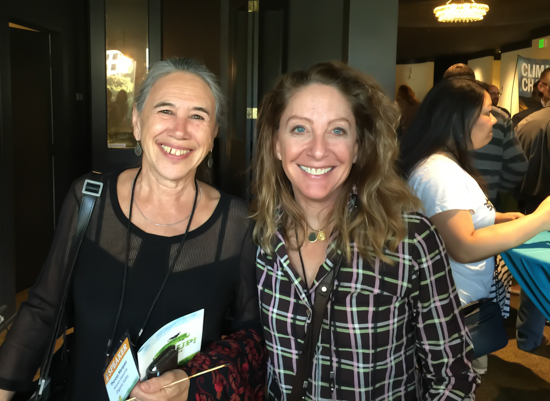
With Theresa Marquez

